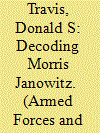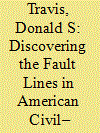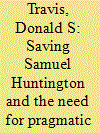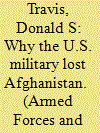|
|
|
Sort Order |
|
|
|
Items / Page
|
|
|
|
|
|
|
| Srl | Item |
| 1 |
ID:
173753


|
|
|
|
|
| Summary/Abstract |
The American sociologist Morris Janowitz presented two world views of security named “absolutist” and “pragmatist.” This dualistic paradigm endures into the 21st century and explains how complex and contentious security options are debated within the U.S. security establishment. His paradigm also reveals a condition called the “hegemon trap,” which means that the more powerful militarily that a state becomes relative to other states, the less likely it will fight a large-scale conventional war, resulting in frequent and perpetual limited, low-intensity, and unconventional wars. Based on experiences learned since the Vietnam War, the United States can improve global security by balancing resources between absolutist and pragmatist outlooks. This requires devoting a greater share of resources toward peacetime engagement, stability operations, and unconventional warfare.
|
|
|
|
|
|
|
|
|
|
|
|
|
|
|
|
| 2 |
ID:
161545


|
|
|
|
|
| Summary/Abstract |
This essay is in response to Thomas Crosbie and Meredith Kleykamp’s article that investigates relationships between what they consider to be three fault lines in the American military profession: ethical lapses, expertise, and identity. As they explore the literature to contemplate how professionalism might help to prevent ethical lapses, they also seek to reveal relationships between lapses, military expertise, and identity. To enhance the relevance of their research, it is recommended that they examine ethical lapses more broadly. Their core subject is American civil–military relations, which is a complex, contentious, and often ambiguous topic. They can mitigate the ambiguity by developing a clear problem statement and a set of research assumptions. In addition, because not all lapses are treated the same, they can be categorized to identify more serious lapses, which will allow for a focused examination of institutional responses to the lapses. Also, integrating other academic approaches such as political science and history into their research will improve the theoretical and explanatory power of their investigation. Adopting these and other aspects of inquiry will support the testing of their six hypotheses and improve our understanding of the military profession.
|
|
|
|
|
|
|
|
|
|
|
|
|
|
|
|
| 3 |
ID:
167828


|
|
|
|
|
| Summary/Abstract |
This essay is responding to Dr. Ionut Popescu’s review of the article “Saving Samuel Huntington and the Need for Pragmatic Civil-Military Relations.” He challenges the pragmatist outlook by questioning its usefulness to “manage relations between the military and its civilian superiors in a democracy such as the United States.” Based on the concerns of Morris Janowitz regarding military relations, three assertions are made in defense of the pragmatic approach. First, the choice between “professional versus civilian supremacy” for making crucial decisions during wartime is misleading because it is based on obsolete thinking from the twentieth-century Cold War. Second, types of wars waged are determined by complex and provisional decision-making processes amid political struggle. Third, Huntington’s civil–military theory wrongly maligns the word “politics” by distorting its meaning and purpose. Politics is a natural process and an essential feature of democracy.
|
|
|
|
|
|
|
|
|
|
|
|
|
|
|
|
| 4 |
ID:
153621


|
|
|
|
|
| Summary/Abstract |
How the U.S. military establishment interacts with other parts of the American government and the people impacts American national power. Because civil–military relationships are influenced by the context of the environment and the “kind of war” being waged, there are a variety of ways that military and civilian leaders can work together to improve the nation’s security. This article proposes an alternative civil–military relations model called pragmatic civilian control. It integrates Samuel Huntington’s objective civilian control theory with traditional American political philosophy and concepts established by Morris Janowitz, while accounting for current geopolitical conditions.
|
|
|
|
|
|
|
|
|
|
|
|
|
|
|
|
| 5 |
ID:
193058


|
|
|
|
|
| Summary/Abstract |
Why did Afghanistan falter as a U.S. partner? America’s war in Afghanistan was lost for many reasons, but the U.S. military contributed to its downfall in two ways. First, U.S. combat units, trained to fight conventional battles, conducted counterterrorism operations (aka “search and destroy” missions) against guerilla forces that resulted in hardening the resolve of the enemy while causing widespread and senseless civilian casualties. Second, the Afghan military could not exist without U.S. logistical and material support. Because the Afghan Army was trained and equipped to fight a conventional-type war, they were incapable of operating independent of U.S. support, and could not survive on their own against guerrilla forces in a protracted civil war. Therefore, the Afghan security forces were not properly trained and equipped, demonstrating that the U.S. military repeated mistakes of the Vietnam War. It is argued that the United States must temper its conventional warfare mindset and re-direct resources toward improved ways to conduct limited wars against irregular adversaries. The constabulary forces concept described by Morris Janowitz is a feasible way to improve the chances that U.S. forces will succeed in such limited wars.
|
|
|
|
|
|
|
|
|
|
|
|
|
|
|
|
|
|
|
|
|